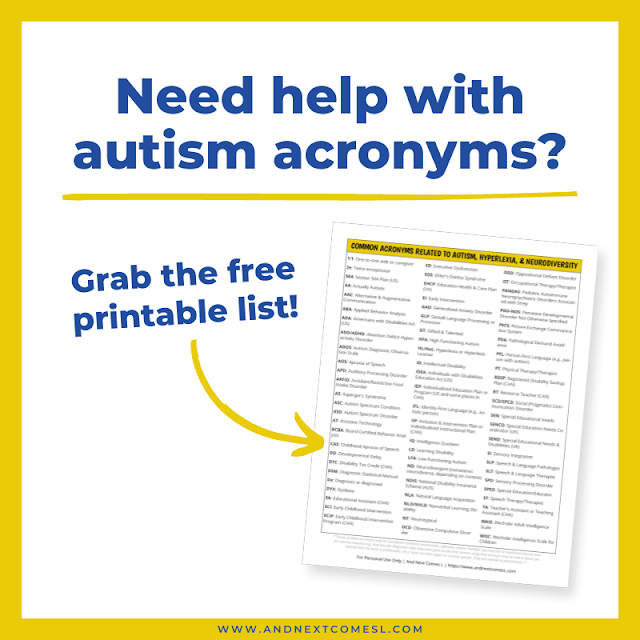I'm really not a fan of using acronyms, simply because they can be confusing and unclear. It's not always easy to figure out what those acronyms they stand for.
After all, certain acronyms can have multiple meanings because they're used in multiple niches and/or different communities or contexts. So, they might mean one thing in the autistic space and something else entirely in another community.
Acronyms can also be frustrating for those who are new to these spaces or communities. It's another thing they have to quickly learn, on top of everything else. For instance, you'll regularly see questions like "What is AAC?" or "What is ABA?" from new members in autism communities (don't worry those acronyms are included below if they're new to you).
Then there are region specific acronyms. For instance, where I live, we don't have Individualized Education Plans or IEPs. We have Inclusion and Intervention Plans or IIPs.
I know that it can be overwhelming to keep up with all of the different autism acronyms. Thankfully, you've now got this list of common acronyms from the neurodiversity, disability, and autism communities to help you keep them all straight.
In case you don't know, FYI means For Your Information. While it's not an autism acronym, the whole idea behind this article is to provide you with information. So that's a bit behind why I selected the stock photo that I did.
Neurodiversity, Disability, & Autism Acronyms List
Below you will find a list of some of the most common acronyms used in autism and hyperlexia communities, as well as some other neurodiversity or disability related acronyms. Some acronyms for common co-occurring conditions are also included.
Some of the acronyms are specific to certain countries or regions around the world and some are more universal and used worldwide. I've indicated country specific ones in parentheses as needed. You might notice lots of Canadian acronyms because, well, I'm Canadian.
It's also important to note that some of the acronyms below are used in the broader disability community and aren't necessarily autism specific. However, the goal here was to highlight the most common acronyms that you might encounter in autism support groups or autistic spaces.
Please note that I've also included acronyms that may be considered outdated, problematic, offensive, and/or harmful (e.g., HFA, AS, PDD-NOS), but may still be used from time to time for various reasons (e.g., that was the diagnostic label they were given, they're new and haven't yet learned why those terms may be problematic, etc.).
Remember, this list is just to help you make sense of the acronyms you may come across so it is not an exhaustive list by any means. There are likely lots of acronyms that I've missed.
0-9
- 1:1: One-to-one aide or caregiver
- 2e: Twice-exceptional
- 504: Section 504 Plan (US)
A-B
- AA: Actually Autistic
- AAC: Alternative and Augmentative Communication
- ABA: Applied Behavior Analysis
- ADA: Americans with Disabilities Act (US)
- ADD/ADHD: Attention Deficit Hyperactivity Disorder
- ADOS: Autism Diagnostic Observation Scale
- AOS: Apraxia of Speech
- APD: Auditory Processing Disorder
- ARFID: Avoidant/Restrictive Food Intake Disorder
- AS: Asperger's Syndrome
- ASC: Autism Spectrum Condition
- ASD: Autism Spectrum Disorder
- AT: Assistive Technology
- BCBA: Board Certified Behavior Analysis
C-F
- CAS: Childhood Apraxia of Speech
- DD: Developmental Delay
- DTC: Disability Tax Credit (CAN)
- DSM: Diagnostic Statistical Manual
- Dx: Diagnosis or diagnosed
- DYX: Dyslexia
- EA: Educational Assistant (CAN)
- ECI: Early Childhood Intervention
- ECIP: Early Childhood Intervention Program (CAN)
- ED: Executive Dysfunction
- EDS: Ehler's-Danlos Syndrome
- EHCP: Education Health & Care Plan (UK)
- EI: Early Intervention
G-K
- GAD: Generalized Anxiety Disorder
- GLP: Gestalt Language Processing or Processor
- GT: Gifted and Talented
- HFA: High Functioning Autism
- HL/HxL: Hyperlexia or Hyperlexic Learner
- ID: Intellectual Disability
- IDEA: Individuals with Disabilities Education Act (US)
- IEP: Individualized Education Plan or Program (US and some places in CAN)
- IFL: Identity-First Language (e.g., autistic person)
- IIP: Inclusion & Intervention Plan or Individualized Instructional Plan (CAN)
- IQ: Intelligence Quotient
L-O
- LD: Learning Disability
- LFA: Low Functioning Autism
- ND: Neurodivergent (sometimes neurodiverse, depending on context)
- NDIS: National Disability Insurance Scheme (AUS)
- NLA: Natural Language Acquisition
- NLD/NVLD: Nonverbal Learning Disability
- NT: Neurotypical
- OCD: Obsessive Compulsive Disorder
- ODD: Oppositional Defiant Disorder
- OT: Occupational Therapy or Therapist
P-R
- PANDAS: Pediatric Autoimmune Neuropsychiatric Disorders Associated with Strep
- PDD-NOS: Pervasive Developmental Disorder Not Otherwise Specified
- PECS: Picture Exchange Communication System
- PDA: Pathological Demand Avoidance
- PFL: Person-First Language (e.g., person with autism)
- PT: Physical Therapy or Therapist
- RDSP: Registered Disability Savings Plan (CAN)
- RT: Resource Teacher (CAN)
S-Z
- SCD/SPCD: Social (Pragmatic) Communication Disorder
- SEN: Special Educational Needs
- SENCO: Special Education Needs Coordinator (UK)
- SEND: Special Educational Needs and Disabilities (UK)
- SI: Sensory Integration
- SLP: Speech and Language Pathologist
- SLT: Speech and Language Therapist
- SPD: Sensory Processing Disorder
- SPED: Special Education or Educator
- ST: Speech Therapy or Therapist
- TA: Teacher's Assistant or Teaching Assistant (CAN)
- WAIS: Wechsler Adult Intelligence Scale
- WISC: Wechsler Intelligence Scale for Children
I know that it can be hard to keep track of all of these different autism acronyms. But, hopefully, this list will be a good reference for you as you navigate autistic spaces and autism support groups.




